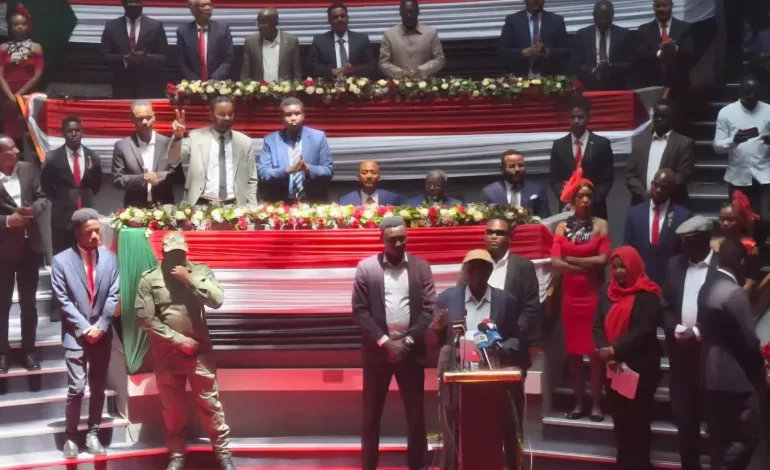How Can Sudan’s Response to Kenya’s Hosting of the “Parallel Government” Meeting Be Assessed?

Report by Al-Noor Ahmed Al-Noor
Relations between Khartoum and Nairobi have escalated to a crisis level following the Kenyan government’s hosting of Rapid Support Forces (RSF) leaders and their political allies for the signing of a charter to establish a parallel government. This comes less than a month after Sudanese Foreign Minister Ali Youssef visited Nairobi.
Upon returning to Sudan, Youssef stated that Kenya’s stance on Sudan had changed significantly in recent times. He claimed that Nairobi had reconsidered its position based on new developments in the war and that Kenyan President William Ruto assured him that Kenya would not recognize any parallel government in Sudan or any other African country.
The minister’s visit had previously resolved a diplomatic crisis in January 2024 when Sudan recalled its ambassador to Kenya in protest against Ruto’s reception of RSF leader Mohamed Hamdan Dagalo “Hemedti,” who has been at war with the Sudanese army since April 2023.
A New Crisis
In a new development, Sudan’s Foreign Ministry summoned its ambassador to Kenya, Kamal Jabara, on Thursday in protest against “Kenya’s hosting of meetings for the rebel militia and its allies—another hostile step against Sudan,” according to a ministry statement.
The Sudanese Foreign Ministry condemned President Ruto’s stance, calling it “shameful” for “embracing and supporting a conspiracy to establish a government for a militia responsible for genocide.”
The ministry further claimed that the Nairobi meetings were between “the Janjaweed terrorist militia and its followers” with the goal of forming a parallel government to the legitimate Sudanese administration.
Additionally, it accused Nairobi of becoming “a key center for the political, propaganda, financial, and logistical activities of the militia.”
Diplomatic Dispute
On Tuesday, the Sudanese Foreign Ministry expressed regret over Kenya allowing the “political charter” event, which paves the way for an RSF parallel government. It described Kenya’s actions as encouraging division and hostility toward the Sudanese people.
Sudanese government spokesperson and Minister of Information, Khaled Al-Eisair, stated on Wednesday that a joint meeting of the Sovereignty Council and the Council of Ministers had decided to form a committee to address Kenya’s position following Nairobi’s hosting of the conference.
Conversely, the Kenyan government issued a statement defending its actions, saying that hosting Sudanese groups in Nairobi was part of its efforts to find solutions to end the war in Sudan, in coordination with the United Nations and the African Union.
Kenya insisted that its goal was to help Sudan achieve security and political stability through civilian governance.
Behind the Scenes
According to African sources at the African Union headquarters in Addis Ababa, which spoke to Al Jazeera Net, several African capitals have conveyed their concerns to the Kenyan presidency about the RSF’s push to establish a parallel government. They fear it could set a dangerous precedent on the continent, where multiple armed groups and militias operate in various countries.
The sources, who requested anonymity, suggested that the postponement of the RSF’s planned Thursday press conference in Nairobi might indicate that Kenyan authorities had prohibited the formal announcement of the parallel government. Instead, they appear to have limited the Sudanese gathering to a political event, avoiding a move that could jeopardize Kenya’s mediation role.
Meanwhile, Sudanese Journalists’ Union President Al-Sadiq Al-Rizeigi revealed that preparations for the signing of the founding charter and the announcement of a parallel government had been underway for weeks. Initially, the event was planned for Kampala, Uganda.
However, according to Al-Rizeigi, Ugandan President Yoweri Museveni—aware of the political risks and potential impact on his country—declined to host the meetings.
He further noted that during Sudanese Foreign Minister Ali Youssef’s visit to Nairobi, Ruto had promised not to allow any event that would lead to the declaration of a parallel government from Kenya, affirming his commitment to good neighborly relations and his intention to visit Sudan.
Gradual Escalation
According to Al-Rizeigi, senior Kenyan political and security officials have assured Sudan that they do not wish to be embroiled in Sudan’s internal affairs. They hinted that President Ruto and his government are under significant external pressure to host the RSF meeting, despite their awareness of the potential harm to Kenya’s interests.
Political analyst Walid Al-Tayeb told Al Jazeera Net that President Ruto has substantial financial and commercial ties with the RSF leadership. These “business interests” make him susceptible to pressure from regional powers closely linked to Hemedti and invested in Kenya.
The Sudanese government, aware of its leverage, is taking a measured approach in its response to Kenya. At this stage, it aims to thwart the establishment of a parallel government from Kenyan territory.
According to Al-Tayeb, Sudan has several pressure tactics it could use against Kenya, including closing its airspace to Kenyan airlines, increasing operational costs, and halting tea and coffee imports from Kenya. It could also escalate its diplomatic measures if necessary.
Source: Al Jazeera Net



